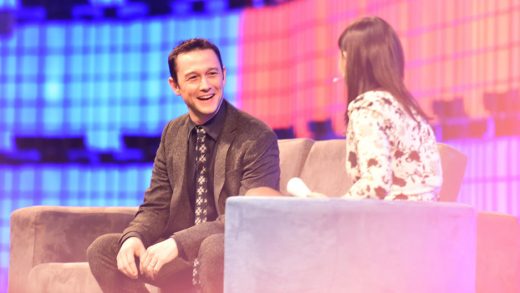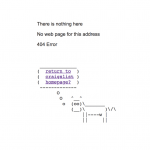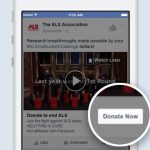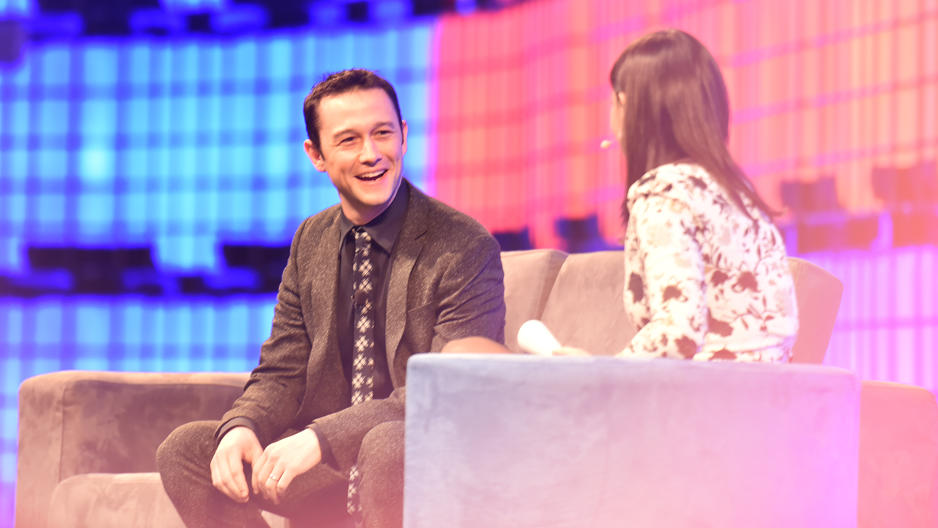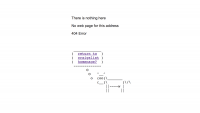Joseph Gordon-Levitt On How To Unleash The Creative Potential Of The Internet
Joseph Gordon-Levitt believes too much of the internet is self-centered and borders on narcissistic.
It’s hard to disagree.
Take a look at just about any social media feed and you’ll see friends, family, and acquaintances drawing attention to themselves in the form of selfies, blog posts, videos, and updates. However, his company HitRECord, helps people put their creative talents to better use while fostering creative collaboration online.
The platform invites artists, photographers, filmmakers, writers, and other creative types to upload their work where it can be featured in collaborative projects, including books, movies, and TV shows. When an artist’s soundtrack, design, script, or other creative element gets used in a production they are compensated for their work. Since launching in 2010 the company has dished out over $2 million to creators on its online network. It’s also built a collaboratively produced variety show called HitRECord on TV.
Fast Company caught up with Gordon-Levitt at the Web Summit conference in Lisbon, Portugal, to chat about fostering creative collaboration between strangers on the internet, the awkward relationship between art and commerce, and how he hopes to move the focus of digital media away from the self—and toward a collective.
Fast Company: Last year you told us that you “don’t see the HitRECord community as a crowd to be sourced,” but rather “as a group of thousands of artists.” Now you’re at Web Summit delivering a presentation called The Difference Between a Crowd and a Community. Why are you so adamant about this distinction?
Joseph Gordon-Levitt: One of the differences is a community is made up of unique individuals. Every single individual in that community brings their own unique thing to the table and is important. In a crowd it’s numbers, it’s not individuals. The art that we make together is all made by unique individuals with their unique contributions. We have found that as our community has grown, the art that we’ve made has gotten better when you have a wider variety of voices contributing. But it’s not because of some kind of number-crunching algorithm, which is what I think of when I think about crowdsourcing. It’s useful for certain things, but it’s not so useful for being creative.
FC: Many online creative collaboration platforms rely on unpaid contributions by passionate artists who just want a platform for their creative works, but HitRECord actually compensates its contributors. Where do you see the line between creativity and commerce? Would you discourage people from publishing their work online for free?
JGL: Maybe it’s because I’ve gotten old or something, but the more I learn about how the world actually works and how things get done, the less distinction I make between creativity and commerce. I think when you have a fantasy about creativity and you’re just creating things in your mind you can tell yourself ‘money doesn’t matter.’ But if you’re actually trying to get something done in the real world you have to confront the reality that money is going to come into it, and there are artful ways to fund the big, amazing, cool, creative projects you want to do. That’s why HitRECord is a for-profit company.
The 20th-century archetype of the artist is someone who’s like, ‘Oh I’m just an artist, I don’t think about all that stuff that the suits think about. They just came and signed me and swept me away to my fairytale rock star life.’ That story barely exists anymore, if at all, and I say good riddance. I don’t understand the benefit of an artist being divorced from the realities of real people in the real world. For those of us who are passionate about creativity surviving into the 21st century, we’ve got to be creative about not just the content, but the form.
FC: Speaking of the form, you began your career in film and television. How does that translate onto the internet? What have you learned about switching mediums?
JGL: A movie or a TV show is just one directional. You have the artist and you have the audience and there’s a solid wall in between them, whereas the internet facilitates something completely different. That’s at the heart of what HitRECord is.
In the last 10 years, the breaking down of those barriers, I think, has translated into something that is only a baby step forward from 20th-century media. What you see when people watch videos on the internet is mostly not very different from watching TV in the ’50s. I think that’s going to change. I think the technology itself offers the potential to have the media become something that is far more constructive and collaborative. We’re not necessarily there yet, but that’s often the case with a new, powerful technology. It takes some time.
The first generation that inherits technology historically imitates old technologies. When the printing press was invented all they did was print Bibles for 100 years, and it wasn’t particularly revolutionary. Then, once the new generations got their hands on the printing press, they started printing books that led to the Enlightenment, and the birth of science and democracy, and the industrial revolution, and this enormous explosive progress. I think we’re just the first generation of the internet and we’re mostly using it to imitate old forms. This phone is a TV in my pocket. We’re not using it to do brand-new things, and I think we will.
FC: How far away do you believe we are to reaching the full potential of the internet as a creative medium?
JGL: I think about that all the time, and I think it’s going to go a lot faster. There were 200 years between the printing press and the Enlightenment, but the whole world moved so much more slowly back then. Things move much more quickly now. I think it’s starting to happen already.
FC: Based on the talks you’ve given this week, it seems like the Joseph Gordon-Levitt recipe for success is some combination of technology, creative energy, and a little bit of pain and suffering. How would you describe that mix?
JGL: HitRECord did come out of a moment in my life that was sort of painful. I had been acting since I was young and then I quit to go to college. When I tried to get back into acting I couldn’t get a part, and that was really painful. When you’re an actor you want to create, you want to express yourself, but you’re relying on someone else to give you a part. I realized this couldn’t be the way things go. I have to take responsibility for my own creative outlet, and that was the beginning. I sort of came up with this little turn of phrase, “hit record,” push the button. Hitting that little red circle was my metaphor for getting up and doing it. I think a lot of the low moments in my life have ultimately spurned me towards some of the highest. Maybe I’m just an optimist.
Fast Company , Read Full Story
(17)

